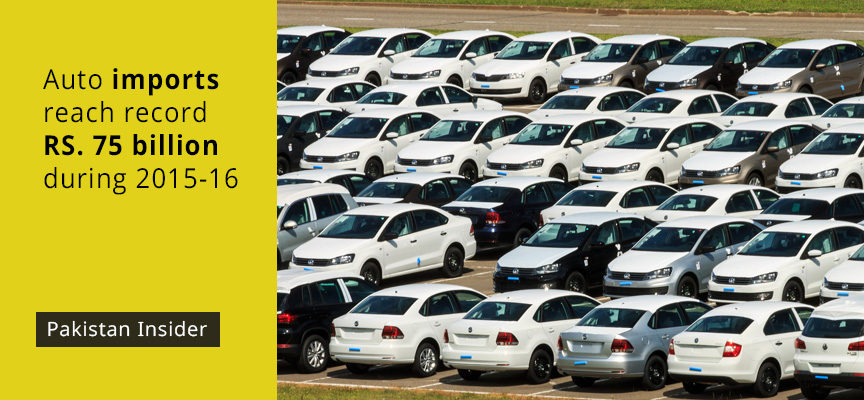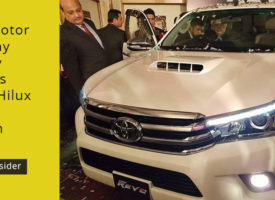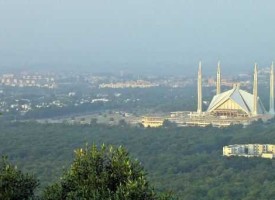According to official numbers, imports of used cars have reached Rs.75 billion during the outgoing fiscal year. This year, 53,600 units were sold versus 32,100 units last year, reaching its all-time high. Nonetheless, the implications of rising imports are not encouraging, putting extensive pressure on country’s trade balance.
Pakistan’s auto sales of locally produced cars have seen a huge jump of 17% during fiscal year 2015-16 on a yearly basis. However, this number looks trivial when compared with the imports of used cars witnessing a mammoth rise of 67% during the same period.
Effects of rising auto imports
Sale of locally produced vehicles has been adversely affected during the last few years due to burgeoning demand of imported cars. Mashood Ali Khan, Senior Vice Chairman Pakistan Association of Automotive Parts and Accessories Manufacturers (PAAPAM) while talking to media highlighted that it is crucial for Pakistan to start investing in its auto industry. He further added, Pakistan being a country of 200 million people under the age of 30 and investment in this sector would create job opportunities for our youth.
Khan said, the amount spend on imports if re-directed towards local investment would be enough to establish two Honda Atlas-sized plants in the country. He believes imports are denting local economy by not creating job opportunities for Pakistani talent. He stated:
“Import of used cars can never serve this objective”
The proponents of imported cars believe that local producers do not provide enough value for money and this void is filled by imported cars. Chairman Adil Khan at Automotive Traders and Importers Association Karachi defended the import, saying importers also employ a large number of workers at their showrooms.
Long term solution
Although there is some merit in importers’ stance since local producers offer very limited options at high prices. However, one cannot undermine the adverse impact of bulging imports on economic development. The auto policy should boost foreign investors’ confidence to pump their money in Pakistani auto sector yet they are reluctant to compete with more than 50,000 used cars every year, stated by Adil Khan.
On a long term basis, Pakistani auto industry requires heavy investments in new plants. Local producers need to provide more options to rising consumer demands and offer high value for money. Competition from imported cars will continue to put pressure on auto manufacturers unless stringent measures are taken by the government to safeguard and sustain local industry.
Please comment and suggest which side of the story has more merit.
image credit: bigstockphoto








Pakistan can’t manufacture a small thing itself….lets say a liter, a tyre, a torch, a cell, not even a diaper (think of it, everything says made in china)….what r we taking about? We intend to made rockets n planes n cars? Have a heart….
PAAPAM: How much (%) actually a car is manufactured by Pakistan? I would say more than 80% is impoted in actual n the reality of fact is, whatever rest (around 20%) is done by Pakistan is substandard (compare it with Japanese version of the same car, u ll fell the shame).
Now, b4 I waste more time, let me come to conclusion right away….
1. If we can’t manufactur a liter cheaper than china, than it is better to import it…(u can imagine anything in place of liter e.g wheat, rice, mobile phone, planes, AC, TV n obviously a ”car”).
2. Providing cars even at lesser than half rates n that too impoted, provided government reduces its taxes to half (which ultimately will be eaten up by government in the garb of corruption…).
3. Providing a cheap thing to all, may render few people jobless, as they will be relived from the other side by buying cars cheaper n otherwise more jobs/work will automatically be generated in import industry.
4. Imported cars have no match to Local manufactured cars, even of the same kind.
5. Only Deewan was worth it among all local manufacturers n we all know why…
6. Government should really think of reducing import taxes / custom duties, it is in the interest of the people of the country Pakistan n people should be the 1st priority, which is not….
7. May companies n brands will be interested to invest in Pakistan n a competition of car companies will take place, hence bringing investment.
Lobbying by the manufacturers be curtailed, plz…it is in the interest of people n everyone understands it (the only reason that increases custom duties n taxes on import). A very cheap car cost us 3 times the price it has actually been bought for…
N at last but not the least, people r fed up with the policies n governments on everything (including car policies)….plz start thinking positive…..we r a genius nation but on wrong lines…each 1 of us has to play its part inorder to get back to track….
Less, be sure people r so fed up that soon they will burst up/out against the government n loss will be of state, as they all (to include all leaders) will fly off to their palaces abroad…
N let me assure, no one is against local manufacturing…make it cheap n of quality, that is our dream too…n we wish u being g8 exporters too…..
Pakistan….Zindabad……!!!!